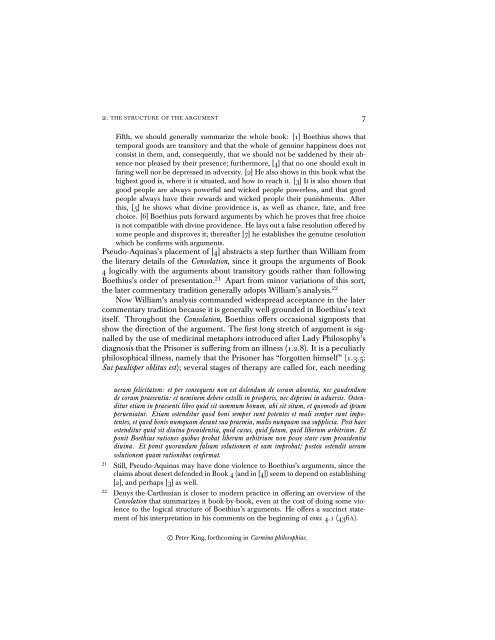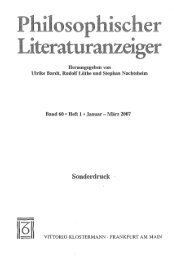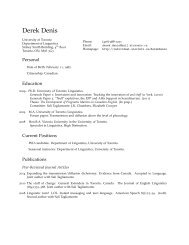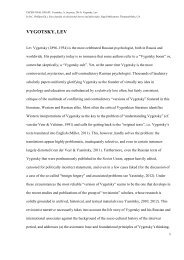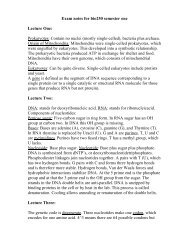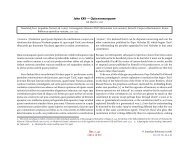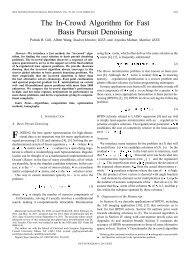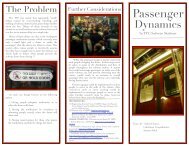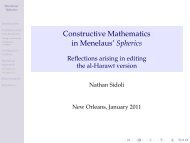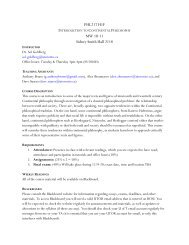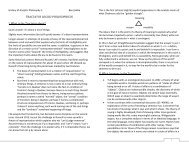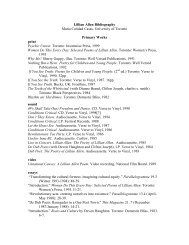BOETHIUS: FIRST OF THE SCHOLASTICS* - University of Toronto
BOETHIUS: FIRST OF THE SCHOLASTICS* - University of Toronto
BOETHIUS: FIRST OF THE SCHOLASTICS* - University of Toronto
You also want an ePaper? Increase the reach of your titles
YUMPU automatically turns print PDFs into web optimized ePapers that Google loves.
2. <strong>THE</strong> STRUCTURE <strong>OF</strong> <strong>THE</strong> ARGUMENT 7<br />
Fifth, we should generally summarize the whole book: [1] Boethius shows that<br />
temporal goods are transitory and that the whole <strong>of</strong> genuine happiness does not<br />
consist in them, and, consequently, that we should not be saddened by their absence<br />
nor pleased by their presence; furthermore, [4] that no one should exult in<br />
faring well nor be depressed in adversity. [2] He also shows in this book what the<br />
highest good is, where it is situated, and how to reach it. [3] It is also shown that<br />
good people are always powerful and wicked people powerless, and that good<br />
people always have their rewards and wicked people their punishments. After<br />
this, [5] he shows what divine providence is, as well as chance, fate, and free<br />
choice. [6] Boethius puts forward arguments by which he proves that free choice<br />
isnotcompatiblewithdivineprovidence. Helaysoutafalseresolution<strong>of</strong>feredby<br />
some people and disproves it; thereafter [7] he establishes the genuine resolution<br />
which he confirms with arguments.<br />
Pseudo-Aquinas’s placement <strong>of</strong> [4] abstracts a step further than William from<br />
the literary details <strong>of</strong> the Consolation, since it groups the arguments <strong>of</strong> Book<br />
4 logically with the arguments about transitory goods rather than following<br />
Boethius’s order <strong>of</strong> presentation. 21 Apart from minor variations <strong>of</strong> this sort,<br />
the later commentary tradition generally adopts William’s analysis. 22<br />
Now William’s analysis commanded widespread acceptance in the later<br />
commentarytradition becauseitisgenerallywell-groundedinBoethius’s text<br />
itself. Throughout the Consolation, Boethius <strong>of</strong>fers occasional signposts that<br />
show the direction <strong>of</strong> the argument. The first long stretch <strong>of</strong> argument is signalled<br />
by the use <strong>of</strong> medicinal metaphors introduced after Lady Philosophy’s<br />
diagnosis that the Prisoner is suffering from anillness (1.2.8). It is a peculiarly<br />
philosophical illness, namely that the Prisoner has “forgotten himself” (1.3.5:<br />
Sui paulisper oblitus est); several stages <strong>of</strong> therapy are called for, each needing<br />
ueram felicitatem: et per consequens non est dolendum de eorum absentia, nec gaudendum<br />
de eorum praesentia: et neminem debere extolli in prosperis, nec deprimi in aduersis. Ostenditur<br />
etiam in praesenti libro quid sit summum bonum, ubi sit situm, et quomodo ad ipsum<br />
perueniatur. Etiam ostenditur quod boni semper sunt potentes et mali semper sunt impotentes,etquodbonisnumquamdesuntsuapraemia,malisnunquamsuasupplicia.<br />
Posthaec<br />
ostenditur quid sit diuina prouidentia, quid casus, quid fatum, quid liberum arbitrium. Et<br />
ponit Boethius rationes quibus probat liberum arbitrium non posse stare cum prouidentia<br />
diuina. Et ponit quorundam falsam solutionem et eam improbat; postea ostendit ueram<br />
solutionem quam rationibusconfirmat.<br />
21 Still, Pseudo-Aquinas may have done violence to Boethius’s arguments, since the<br />
claimsaboutdesertdefendedinBook4(andin[4])seemtodependonestablishing<br />
[2], and perhaps [3] as well.<br />
22 Denys the Carthusian is closer to modern practice in <strong>of</strong>fering an overview <strong>of</strong> the<br />
Consolation that summarizes it book-by-book, even at the cost <strong>of</strong> doing some violence<br />
to the logical structure <strong>of</strong> Boethius’s arguments. He <strong>of</strong>fers a succinct statement<br />
<strong>of</strong> his interpretation in his comments on the beginning <strong>of</strong> cons. 4.1 (436A).<br />
c○ Peter King, forthcoming in Carmina philosophiae.


